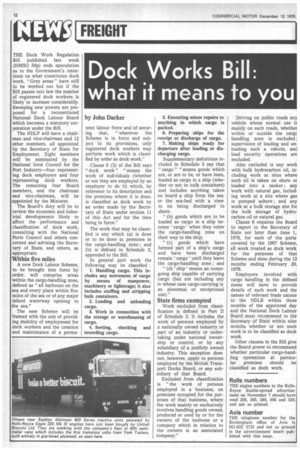Dock Works Bill: what it means to you
Page 16

If you've noticed an error in this article please click here to report it so we can fix it.
by John Darker
THE Dock Work Regulation Bill published last week (HMSO 50p) ends speculation as to the Government's intention's on what constitutes dock work. "Grey areas" have still to be worked out but if the Bill passes into law the number of registered dock workers is likely to increase considerably. Sweeping new powers are proposed for a reconstituted National Dock Labour Board which becomes a statutory corporation under the Bill.
The NDLP will have a chairman and vice-chairman and 12 other members, all appointed by the Secretary of State for Employment. Eight members will be nominated by the National Joint Council for the Port Industry—four representing dock employers and four representing dock workers. The remaining four Board members, and the chairman and vice-chairman, will be appointed by the Minister.
The Board's duty will be to review the economic and industrial developments likely to affect the performance and classification of dock work, consulting with the National Ports Council and others concerned and advising the Secretary of State, and • others, as appropriate.
Within five miles
A new Dock Labour Scheme, to be brought into force by order, will comprise areas within the cargo-handling zone, defined as "all harbours on the sea and every place within five miles of the sea or of any major inland waterway opening to the sea."
The new Scheme will be framed with the aim of providing stability of employment for dock . workers and the creation and maintenance of a perma nent labour force and of securing that, " wherever the Scheme is in force and subject to its provisions, only registered dock workers may perform work which is classified by order as dock work."
Clause 5 (3) of the Bill says "dock work" "means the work of individuals (whether or not they are employed by an employer to do it) which, by reference to its description and the premises where it is done, is classified as dock work by an order made by the Secretary of State under section 11 of this Act and for the time being in force."
The work that may be classified is any which (a) is done or to be done at premises in the cargo-handling zone ; and (b) is defined in Schedule 3, appended to the Bill.
In general port work the following may be classified : 1. Handling cargo. This includes any movement of cargo by means of manpower, machinery or lighterage; it also includes stuffing and stripping bulk containers.
2. Loading and unloading cargo.
3. Work in connection with the storage or warehousing of cargo.
4. Sorting, checking and recording cargo. 5. Executing minor repairs to anything in which -cargo is packed.
6. Preparing ships for the receipt or discharge of cargo.
7. Making ships ready for departure after loading or discharging cargo.
Supplementary definitions included in Schedule 3 say that " cargo " "means goods which are, or are to be, or have been, loaded as cargo in a ship (whether or not in bulk containers) and includes anything taken on board a ship from the sea or the sea-bed with a view to its being discharged to shore.
"(b) goods which are to be loaded as cargo in a ship become 'cargo' when they enter • the cargo-handling zone on their way to the ship; (c) goods which have formed part of a ship's cargo and have been discharged remain ' cargo' until they leave the cargo-handling zone ; and "(d) 'ship' means an oceangoing Ship capable of carrying cargo (but not including any in whose case cargo-carrying is an abnormal or exceptional use)."
State firms exempted
Work excluded from classification is defined in Part II of Schedule 3. It includes the work of persons employed by a nationally owned industry or part of an industry or undertaking under national ownership or control, or by any subsidiary of a publicly owned industry. This exception does not, however, apply to persons employed by the British Transport Docks Board, or any subsidiary of that Board.
Excluded from classification is "the work of persons employed in a business, on premises occupied for the purposes of that business, where the work mainly or exclusively involves handling goods owned, produced or used by or for the owners of the business or a company which in relation to the owners is an associated company." Driving on public roads any vehicle whose normal use is mainly on such roads, whether within or outside the cargc handling zone is excluded ; supervision of loading and unloading • such a vehicle, and load security operations are excluded.
Also excluded is any work with bulk hydrocarbon oil, including work at sites where such oil is taken on shore or loaded into a tanker ; any work with natural gas, including work at a site where gas is pumped ashore ; and any work at a bulk storage site for the bulk storage of hydrocarbon oil or natural gas.
Clause 6 requires the Board , to report to the Secretary of State not later than June 1, 1976, for each of the ports covered by the 1967 Scheme, all work treated as dock work for the purposes of that Scheme and done during the 12 months ending February 29, 1976.
Employers involved with cargo handling in the defined zones will have to provide details of such work and the names of relevant trade unions to the NDLB within three months of the appointed day and the National Dock Labour Board must recommend to the Secretary of State within nine months whether or not such work is to be classified as dock work.
Other clauses in the Bill give the Board power to recommend whether particular cargo-handling operations at particular premises should be classified as dock work.














































































